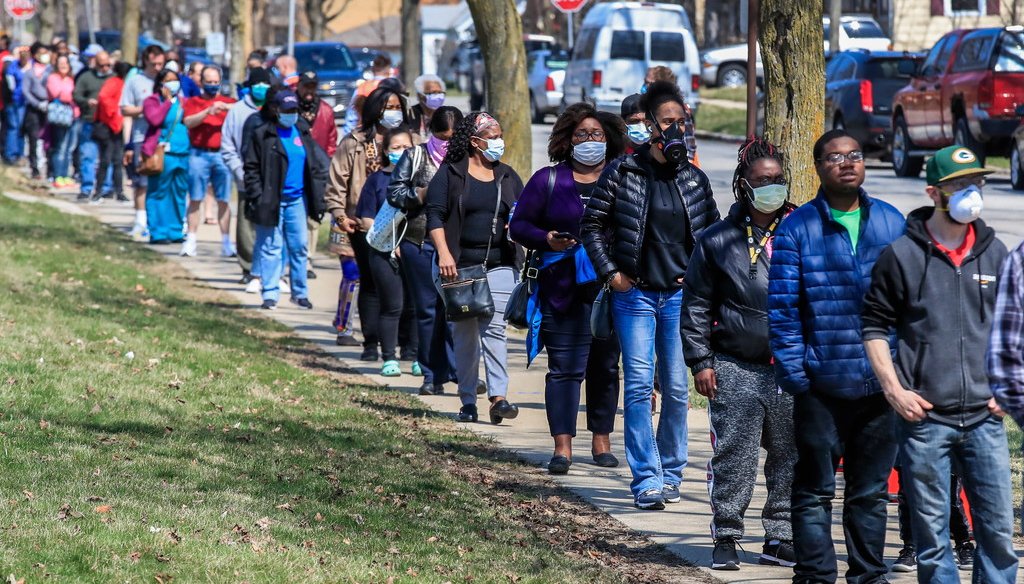A pair of high court rulings set the stage for Wisconsin’s April 7, 2020 pandemic election.
The Wisconsin Supreme Court struck down an order from Gov. Tony Evers that would have moved the election back to June, which kept in-person voting in place.
And the U.S. Supreme Court ruled that all absentee ballots had to be postmarked by Election Day, reversing a federal judge’s order, forcing thousands who requested but didn’t receive an absentee ballot to vote in person if they wanted their vote to count.
A viral image on Facebook claims the latter ruling had some irony to it.
"Conservative Supreme Court Justices vote remotely to deny Wisconsin voters their right to vote remotely," the April 7, 2020, post says, accompanied by pictures of the five men comprising the conservative majority of the U.S. Supreme Court.
Sign up for PolitiFact texts
This post was flagged as part of Facebook’s efforts to combat false news and misinformation on its News Feed. (Read more about our partnership with Facebook.)
There are a couple elements here — the method of voting and the claim about voting rights.
Let’s investigate.
Method of voting
The highest court in the land did indeed issue its April 6, 2020, Wisconsin election ruling without meeting in person.
Beginning with a March 20, 2020, conference, the Supreme Court has functioned remotely, according to Richard Wolf, who covers the court for USA TODAY. It has postponed all oral arguments for March and April.
It’s been a while since that happened, the court said.
"The Court’s postponement of argument sessions in light of public health concerns is not unprecedented," a March 16, 2020, release said. "The Court postponed scheduled arguments for October 1918 in response to the Spanish flu epidemic. The Court also shortened its argument calendars in August 1793 and August 1798 in response to yellow fever outbreaks."
The "right" to vote remotely
The second part of this claim isn’t so simple, asserting there is a right to vote remotely that was stripped away.
We’ll start by backing up a step.
The issue before the U.S. Supreme Court was whether to allow ballots postmarked after Election Day to be counted as long as they arrived by April 13.
A prior federal court ruling had extended the deadline by which clerks had to receive absentee ballots from April 7 — Election Day — to April 13. Republicans argued those ballots still had to be postmarked by Election Day in order to count, while Democrats argued anything that arrived by April 13 should be allowed — effectively extending the election by six days.
By a 5-4 vote, with all conservative justices in favor, the Supreme Court ruled ballots had to be postmarked by Election Day.
"Extending the date by which ballots may be cast by voters — not just received by the municipal clerks but cast by voters — for an additional six days after the scheduled election day fundamentally alters the nature of the election," the majority opinion says.
So did that amount to denying voters their rights to vote remotely?
The longstanding remote voting availability in Wisconsin has been that voters are permitted to submit absentee ballots up to Election Day. That was not changed. The high court simply denied a request to extend beyond Election Day the period in which votes could be turned in.
The nuance here is that thousands of Wisconsinites never received the absentee ballots they requested — in some cases well before the election. So those voters were denied the ability to vote remotely, but that was due to systematic errors in ballot distribution, not directly via Supreme Court action.
Liberals argued accommodations should have been made for those people who did not receive ballots they requested in the required timeframe (up to the Friday before the election).
Our ruling
A Facebook post says conservative Supreme Court justices voted remotely "to deny Wisconsin voters their right to vote remotely."
The court vote involved did take place remotely.
But the latter half of this claim overreaches. The traditional "right" to vote remotely involves submitting an absentee ballot by Election Day. That right was not taken away. The high court simply did not extend that right to days past the election as Democrats requested.
For a statement that is partially accurate but leaves out important details or takes things out of context, our rating is Half True.




